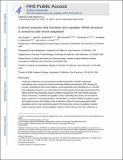A Stress Response that Monitors and Regulates mRNA Structure Is Central to Cold Shock Adaptation
Author(s)
Rouskin, Silvi; Li, Gene-Wei; Weissman, Jonathan S.
DownloadAccepted version (2.411Mb)
Terms of use
Metadata
Show full item recordAbstract
Temperature influences the structural and functional properties of cellular components, necessitating stress responses to restore homeostasis following temperature shift. Whereas the circuitry controlling the heat shock response is well understood, that controlling the E. coli cold shock adaptation program is not. We found that during the growth arrest phase (acclimation) that follows shift to low temperature, protein synthesis increases, and open reading frame (ORF)-wide mRNA secondary structure decreases. To identify the regulatory system controlling this process, we screened for players required for increased translation. We identified a two-member mRNA surveillance system that enables recovery of translation during acclimation: RNase R assures appropriate mRNA degradation and the Csps dynamically adjust mRNA secondary structure to globally modulate protein expression level. An autoregulatory switch in which Csps tune their own expression to cellular demand enables dynamic control of global translation. The universality of Csps in bacteria suggests broad utilization of this control mechanism. Zhang et al. identified an mRNA structure surveillance system mediated by Csps and RNase R that facilitates translation recovery after cold shock in E. coli. Their work proves insights into a post-transcriptionally regulated bacterial stress response and suggests broad utilization of this control mechanism across all bacteria.
Date issued
2018-04Department
Massachusetts Institute of Technology. Department of Biology; Whitehead Institute for Biomedical ResearchJournal
Molecular cell
Publisher
Elsevier BV
Citation
Zhang, Yan et al. “A Stress Response that Monitors and Regulates mRNA Structure Is Central to Cold Shock Adaptation.” Molecular cell 70 (2018): 274-286.e7 © 2018 The Author(s)
Version: Author's final manuscript
ISSN
1097-2765